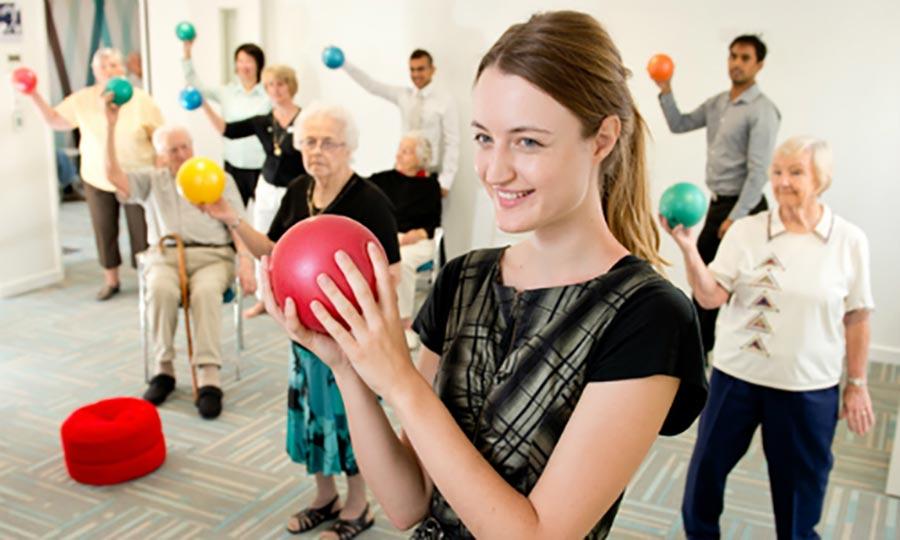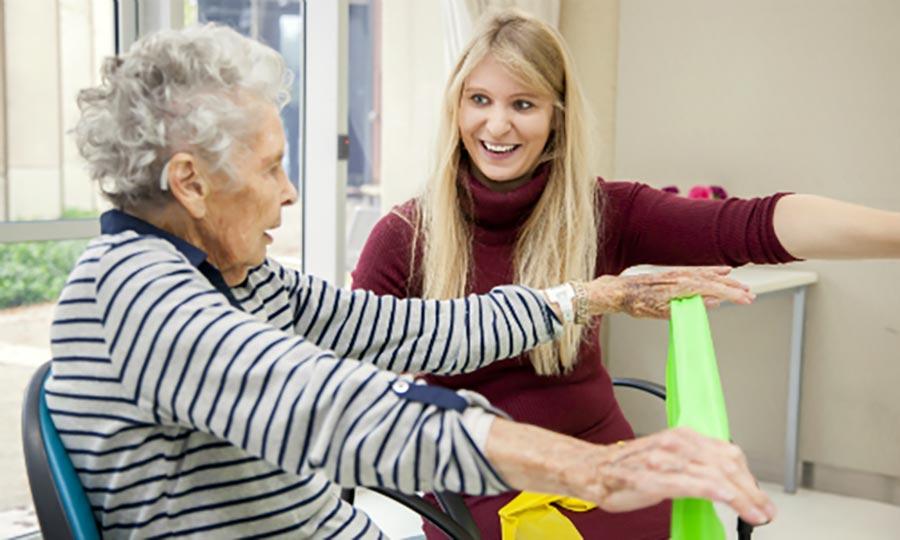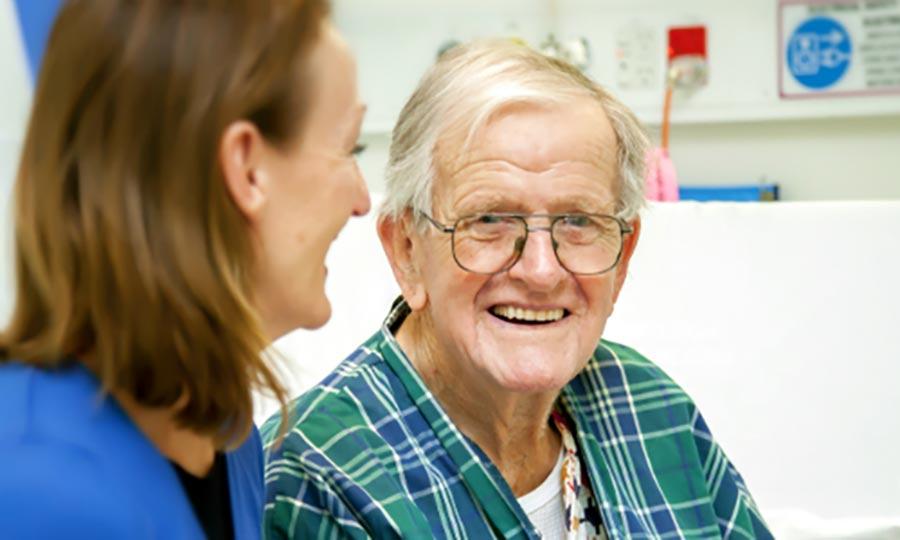Interventions To Treat & Prevent Frailty
We will pilot and test new interventions and technologies to treat and reverse frailty in older people.
-
Effectiveness of exercise interventions on physical function in community-dwelling frail older people: an umbrella review
Lead investigators: Dr Agathe Daria Jadczak, Dr Tim Schultz, Dr Natalie Luscombe-Marsh, Professor Naresh Makwana, Professor Renuka Visvanathan

Several systematic reviews discuss the effects of exercise interventions on important physical function parameters, such as mobility, gait speed, balance and strength. The investigations described in the reviews indicate that multi-component exercise, including strength, endurance and balance training, appears to be the best way in which to improve physical function in frail older people. However, there is still uncertainty as to which exercise characteristics (type, frequency, intensity, duration, setting, combinations) are most effective. This umbrella review aimed to determine the effectiveness of exercise interventions, alone or in combination with other interventions, in improving physical function in community-dwelling older people identified as pre-frail or frail. The results compiled from 7 systematic reviews indicate that pre-frail and frail older adults should participate in a multi-component exercise program, including in particular resistance training, as well as aerobic, balance and flexibility exercises. However, other types of exercise interventions have not been sufficiently studied and their effectiveness is yet to be established. Nevertheless, to optimize the exercise interventions and improve physical function, an optimal combination of intensity, duration and frequency is crucial, as well as gradual increases in these characteristics. Multi-component interventions should be performed up to three times per week for 45–60 minutes per exercise session at a moderate to high intensity aiming to progress to ‘‘somewhat hard’’ on the Borg scale for aerobic exercises and 80% of 1RM for resistance exercises for a duration of at least 2.5 months. Future research should adopt a consistent definition of frailty and investigate the effects of other types of exercise alone or in combination with nutritional interventions so that more specific recommendations can be made.
Media contact: Dr Agathe Daria Jadczak
-
The EXPRESS study: Exercise and protein effectiveness supplementation study
Lead investigators: Dr Agathe Daria Jadczak, Dr Natalie Luscombe-Marsh, Professor Renuka Visvanathan

Frailty is a geriatric syndrome of increased vulnerability, characterised by decreased ability to resist and recover from stressors, as well as loss of muscle mass and strength. It is linked with higher risks of falls, disability, hospital stays, and mortality. Exercise has proven to be beneficial in the treatment of frailty and has a positive effect on physical function and quality of life. It is suggested that exercise in combination with an increased protein intake may be even more effective than exercise alone for improving physical function in older people.
A pilot study was conducted at the Queen Elizabeth Hospital (TQEH) and the Centre for Physical Activity in Ageing (CPAA Hampstead) including community-dwelling older people aged 65 years and older who are frail or at-risk of frailty.
The study aimed to examine the feasibility of recruiting community-dwelling frail older people to a six months program including nutrition and exercise and to determine the effects of exercise in combination with protein supplements on walking speed, grip strength and physical performance. The study will also look at frailty, muscle mass, nutritional intake, physical activity, and quality of life. Ethics approval for this research was obtained from the University of Adelaide Human Research Ethics Committee, The CALHNR Ethics Committee, and CSIRO. The trial was registered with the Australia and New Zealand Clinical Trials Registry (ACTRN). The results are currently being analysed.
Media contact: Dr Agathe Daria Jadczak
-
How do frail older people prefer to receive advice on exercise? A qualitative study
Lead investigators: Dr Agathe Daria Jadczak, Dr Jo Dollard, Dr Neha Mahajan, Professor Renuka Visvanathan

Exercise has proven to be beneficial for numerous age-related diseases and is considered as the most effective strategy to prevent frailty. General practitioners (GPs) have the potential to increase older peoples’ participation in exercise by providing advice on exercise or prescribing exercise. However, little is known about older peoples’ perspectives on the advice they have received relating to exercise and what preferences they might have in this regard.
This study aimed to explore older people’s opinions in relation to being advised about exercise and their perceptions of the GP’s role in promoting exercise for older people using semi-structured interviews. The results suggest that the majority of participants had a positive attitude towards exercise, and many participants indicated a preference for being advised firstly by their GPs and then other healthcare professionals. Participants living in the community reported difficulties in accessing information on exercise and indicated that local governments and GP practices should promote exercise for older people more actively. Participants living in retirement villages, however, reported having access to relevant information and being encouraged to participate in exercise. This research identified a gap in current practice, demonstrating that GPs, healthcare providers and local governments should promote exercise for older people more actively. Convincing health professionals to encourage regular exercise among their older patients would provide an opportunity to avoid and manage frailty in this population.
Media contact: Dr Agathe Daria Jadczak
-
Multi-service frailty intervention trial mFIT
Lead investigator: Professor Ian Cameron
Professor Ian Cameron has completed two single centre intervention trials in Sydney: the Frailty Intervention Trial (FIT) and the Frailty Prevention Trial (pre FIT). The results of this study have provided new insight into treatment options for older people who are frail or at-risk of frailty and living in our community.
This future study will provide treatment for older people who are frail or pre-frail. It will be conducted in multiple sites including aged care health services and general practices in New South Wales and South Australia. Treatment principles developed in previous trials will be fine-tuned and older people will have the opportunity to choose from a range of options to suit their individual circumstances. It is anticipated that exercise programs, nutritional optimisation, support to function independently in the community, disease prevention and chronic disease management will be the main components of the intervention. The design will be a cluster randomised trial and it is anticipated that 1,000 to 1,500 older people will be followed for one to two years. This proposed study will capitalise on the the research strengths of our health economics and knowledge translation research experts.
Media contact: Professor Ian Cameron
-
A randomised controlled feasibility study to evaluate the effects of a goal-setting coaching intervention using feedback from an accelerometer on sedentary time in older people at risk of falls (SMART-MOVE)
Lead investigator: Dr Kareeann Khow, Dr Joanne Dollard, A/Prof Mellick Chehade, A/Prof Olga Theou, Prof Renuka Visvanathan
Sedentary behaviour and falls are important inter-related health issues in older people. One in three people aged ≥65 years fall at least once a year and sedentary behaviour has been identified as one of the risk factors for falls. Falls can lead to major injuries, fractures, loss of independence and premature mortality. Studies have shown that duration of sedentary time increases with age. These dual problems need to be addressed effectively as the older population grows. Accelerometers enable accurate measurement of sedentary time.
This study aims to establish the feasibility and effect of an individualised goal-setting health coaching intervention using feedback initially from an accelerometer and then pedometer over a period of 12 weeks (intervention) compared with providing a one-off advice through an information brochure (control), on sedentary time in older people with a recent fall or at risk of one. This trial will address a key gap in reducing sedentary behaviour among older people at risk of falls within the primary health care setting. (This study has completed recruitment).
Media contact: Dr Kareeann Khow
